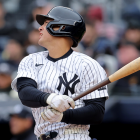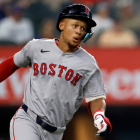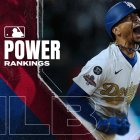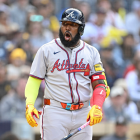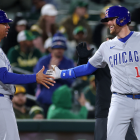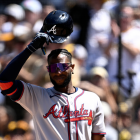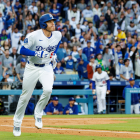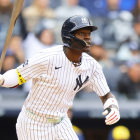Red Sox vs. Rays score: Christian Vázquez's walk-off homer in 13th inning gives Boston ALDS Game 3
In a ridiculous 13-inning marathon, Boston came out on top to take a 2-1 ALDS lead
The Boston Red Sox are one win away from the ALCS and the 100-win Tampa Bay Rays are one loss away from heading home for the offseason. The Red Sox beat the Rays in a marathon ALDS Game 3 at Fenway Park on Sunday (BOS 6, TB 4 in 13 innings) thanks to Christian Vázquez's walk-off home run in the 13th inning. Boston leads the series 2-1.
Much like Game 2, the Rays took an early lead on a first inning home run in Game 3, though it did not last. The Red Sox pieced together four runs after falling behind 2-0, then after the bullpen blew the lead in the eighth, the two relief crews traded zeroes for another four innings. Vázquez walked off the longest game of the 2021 postseason so far.
The walk-off home run is the latest postseason walk-off homer in Red Sox history (13th inning). Vázquez and Hall of Famer Carlton Fisk are the only catchers to hit a postseason walk-off homer in franchise history. Here are eight takeaways from Game 3.
1. There was controversy
The MLB postseason hasn't begun until a relatively unknown and obscure comes into play. Kevin Kiermaier laced a line drive into the right-center field gap with Yandy Díaz at first base in the top of the 13th inning, and the ball ricocheted off the wall and into Hunter Renfroe, then back over the wall for an automatic double. Rather than score the go-ahead run from first, Díaz was sent back to third and Kiermaier to second. Here's the play:
MLB rule 5.05(a)(8) says when "any bounding fair ball is deflected by the fielder into the stands, or over or under a fence on fair or foul territory, (the) batter and all runners shall be entitled to two bases." The call on the field was correct because Renfroe did not knock the ball over the wall intentionally. It's just kind of a dumb rule. Common sense says Díaz would have scored from first on the play since he was running on contact with two outs.
Mike Zunino followed the Kiermaier double with a strikeout, ending the inning. Vázquez then walked it off in the bottom half. The play cost the Rays a run as well as a runner at third with two outs, and who knows how the game plays out from there? Perhaps the pitcher pitches differently and gives up another hit and another run. It is baseball's butterfly effect.
2. Hernandez stayed hot and made history
Call it the Enrique Hernandez series. The Red Sox sometimes center fielder, sometimes second baseman went 5 for 6 with a home run and three doubles in Game 2, becoming only the fifth player in history with four extra-base hits in a postseason game.
Hernandez's heroics continued in Game 3. He lined a double off the Green Monster in his first at-bat, dunked a run-scoring single to center in his second at-bat, then slammed a solo home run over the Green Monster in his third at-bat. That's eight hits spanning Games 2 and 3.
The eight hits are a record for two consecutive games in a single postseason and Hernandez also had a hit in seven consecutive at-bats at one point. That's a Red Sox postseason record and one short of the all-time record, shared by Miguel Cairo, Billy Hatcher, and Reggie Jackson.
Also, Hernandez has already tied a Red Sox record with five extra-base hits in a single postseason series, and he still has at least one game to play. Kevin Youkilis (2007 ALCS and 2008 ALCS), John Valentin (2008 ALDS), and Hall of Famer Carl Yastrzemski (1967 World Series) also accomplished the feat.
Thanks in large part to Hernandez, the Red Sox picked up 35 hits in Games 2 and 3, a new franchise record for hits in consecutive postseason games. Tampa never allowed more than 30 hits in back-to-back games during the regular season.
3. Eovaldi was excellent again
Game 3 started inauspiciously for certified postseason ace Nathan Eovaldi. Wander Franco poked a one-out single to center in the first inning, then Austin Meadows followed with a two-run home run into the bullpen, giving Tampa an early 2-0 lead. Meadows was 7 for 21 with two doubles, a triple, and a homer against Eovaldi going into Game 3.
The Rays were unable to build on that early lead. Eovaldi settled down and retired 14 of the final 17 batters he faced following the home run, including seven strikeouts. He leaned heavily on his splitter after throwing the pitch only eight times in the Wild Card Game. Here are Eovaldi's five most splitter-heavy starts in 2021. You'll notice a pattern.
1. Oct. 10 vs. Rays (ALDS Game 3): 23 splitters
2. July 31 vs. Rays: 23
3. Aug. 11 vs. Rays: 19
4. June 14 vs. Blue Jays: 18
5. July 24 vs. Yankees: 17
Tampa's hitters missed with 10 of their 15 swings against Eovaldi's splitter in Game 3, an absurd rate. Leaning on the splitter has been a clear plan of attack against the Rays and has been all season, yet Tampa was unable to adjust.
Red Sox manager Alex Cora pulled Eovaldi after five innings and only 85 pitches rather than let him face Meadows a third time in a one-run lead, which was a smart move given their history. Overall, Eovaldi now owns a 1.92 ERA in 32 2/3 career postseason innings.
4. Franco's incredible postseason continued
Wander Franco has played like a star since the moment he arrived in the big leagues, and he's been at his best in the postseason. The 20-year-old wunderkind went 2 for 6 with a home run Sunday, and is 6 for 15 with two doubles and a home run in the ALDS overall.
At 20 years and 223 days, Franco is the fifth youngest player to go deep in a postseason game, and the second youngest to do it in the American League. Here are the five youngest players to go deep in a postseason game:
1. Andruw Jones, Braves: 19 years, 177 days (1996 NLCS Game 7)
2. Bryce Harper, Nationals: 19 years, 362 days (2012 NLDS Game 5)
3. Manny Machado, Orioles: 20 years, 96 days (2012 ALDS Game 3)
4. Miguel Cabrera, Marlins: 20 years, 172 days (2003 NLDS Game 1)
5. Wander Franco, Rays: 20 years 223 days (2021 ALDS Game 3)
Franco has multiple hits in all three ALDS games thus far. He's the youngest player ever to start his postseason career with three straight multi-hit games. Only Cabrera (5), Jones (4), and Juan Soto (4) have more career multi-hit postseason games before their 21st birthday than Franco.
5. Pivetta stood tall
Both bullpens stood tall, really, though Nick Pivetta stood the tallest. Fresh off throwing 4 2/3 innings and 73 pitches in Game 1 on Thursday, Pivetta fired another four innings and 67 pitches in Game 2 on Sunday. That's 8 2/3 innings and 140 pitches in 72 hours or so. Game 3 goes down as a well-earned win for Pivetta.
The Rays tied the game on Franco's homer and a Randy Arozarena double in the eighth inning. Even with that, six Boston relievers combined to allow just those two runs in eight innings. They also struck out 12. Red Sox pitchers struck out 20 batters overall, the fourth most in a postseason game in baseball history:
1. Cleveland, 1996 ALDS Game 4 vs. Orioles: 23 in 12 innings
2. Reds, 2020 NL Wild Card Series Game 1 vs. Braves: 21 in 12 1/3 innings
3. Orioles, 1997 ALCS Game 3 vs. Cleveland: 21 in 11 1/3 innings
4. Giants, 2015 NLDS Game 2 vs. Nationals: 20 in 18 innings
5. Red Sox, 2021 ALDS Game 3 vs. Rays: 20 in 13 innings
The 20 strikeouts are easily a new Red Sox postseason record, surpassing their 16 strikeouts in Game 5 of the 2004 ALCS.
Tampa's bullpen deserves a mention here as well. Eight Rays relievers held the Red Sox to one run in 10 1/3 innings before Vázquez's walk-off home run. The two teams combined to throw 389 pitches.
6. Rasmussen gave another short ALDS start
The ALDS has been defined by short starts. Eduardo Rodriguez went 1 2/3 innings in Game 1, Chris Sale went one inning and Shane Baz went 2 1/3 innings in Game 2, and Drew Rasmussen went two innings plus three batters in Game 3. The Red Sox tagged the righty up for three runs on six hits in his two innings.
In Rasmussen's case, the Rays didn't expect much length. He moved into the rotation in August and did not throw more than five innings or 74 pitches in any of his eight starts. Three times Rasmussen faced the Red Sox in those eight starts, and it the familiarity seemed to help in Game 3. They were on him all afternoon.
Tampa is planning a bullpen game in Game 4 -- Luis Patiño was slated to be the "bulk" innings guy, though he threw 15 pitches in 1 1/3 innings before surrendering Vázquez's walk-off homer in Game 3 -- so Sunday's workload is a problem. The Rays used just about their entire staff. No one will be well-rested for Game 4.
7. Schwarber celebrated a routine play
Game 3 was Kyle Schwarber's 11th career start at first base and his inexperience showed in the third inning, when he fielded a Brandon Lowe ground ball and flipped the ball well over Eovaldi's head at first base. Routine play and a textbook error.
Fortunately for Schwarber and the Red Sox, the error didn't lead to a run. And one inning later, Schwarber fielded a similar ground ball from Ji-Man Choi, and successfully flipped the ball to Eovaldi covering first base. He raised his hands in celebration and had a good time with it. Check it out:
Self-deprecating humor always goes over well, especially when you took a 3-2 lead on the scoreboard in the previous inning in a postseason game.
8. The Red Sox are in the driver's seat
Boston is one win away from their second ALCS in the last four years. The last win is always the toughest, and neither team has announced their Game 4 starter. The Rays are expected to go with a bullpen game either way. The Red Sox will most likely start Rodriguez on short rest following his brief Game 1 outing.
Historically, the team that wins Game 3 when a best-of-five series is tied 1-1 has gone on to win the series 72 percent of the time. The odds are in Boston's favor, though the Rays won't go down without a fight.
![[object Object] Logo](https://sportshub.cbsistatic.com/i/2020/04/22/e9ceb731-8b3f-4c60-98fe-090ab66a2997/screen-shot-2020-04-22-at-11-04-56-am.png)









